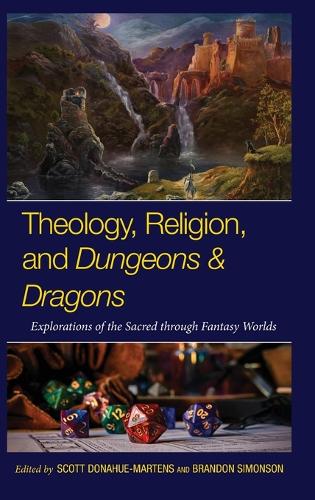
Theology, Religion, and Dungeons & Dragons: Explorations of the Sacred through Fantasy Worlds
(Hardback)
Publishing Details
Theology, Religion, and Dungeons & Dragons: Explorations of the Sacred through Fantasy Worlds
By (Author) Scott Donahue-Martens
Edited by Brandon Simonson
Contributions by Daniel Ambord
Contributions by Michael Buttrey
Contributions by Leah DeJong
Contributions by Scott Donahue-Martens
Contributions by Nathan P. Gilmour
Contributions by Susan Haarman
Contributions by Victoria Hawco
Contributions by Thomas G. Hermans-Webster
Bloomsbury Publishing PLC
Lexington Books/Fortress Academic
15th February 2025
United States
Classifications
Professional and Scholarly
Non Fiction
793.93
Physical Properties
Hardback
300
Width 152mm, Height 229mm
Description
On its 50th anniversary, the tabletop role-playing game Dungeons & Dragons (D&D) has found renewed popularity and a generally positive representation in popular culture. Reflecting on these fifty years of development and history, and looking forward to D&Ds bright future, Theology, Religion, and Dungeons & Dragons: Explorations of the Sacred through Fantasy Worlds explores the intersection of D&D with the academic disciplines of Theology and Religious Studies. From Tolkiens notion of sub-creation to pedagogical ponderings on hell, readers will uncover deeply theological and religious aspects of Dungeons & Dragons in this volume. Unlike some during the so-called Satanic Panic, the authors of this volume embrace D&D as spiritually and theologically formative. Discussions on alignment and campaign settings like Dark Sun and Ravenloft foreground notions of interrelating and wellbeing, and reflections on communal conceptions of canon and spiritual formation chart paths forward by understanding historical realities. This volume responds to growing interest in the academic study of tabletop role-playing games in general and D&D in specific, and it addresses pressing issues in the academic disciplines of Theology and Religious Studies.
Reviews
The editors big tent approach to utopian studies and their consideration of the intersection of theology, religion, and dystopia has produced a wide-ranging volume that opens up as many questions about the nature of dystopia and dystopian literature as it answers. In this regard, it provides a welcome and important departure for further considerations of a number of critical questions. * Utopian Studies *
Donahue-Martenss chapter on Lois Lowrys The Giver, Simonsons on Isaac Asimovs Foundation novels, and Shayna Sheinfelds on Suzanne Collinss Hunger Games series and Veronica Roths Divergent series all stand out for their focus on American literature, as does the first chapter, Dystopia as Demythologized Apocalyptic, by Simonson and Donahue-Martens . . . This introduction establishes themes that will return across the book, such as the rise of dystopian fiction as a manifestation of a post-Christian cultural paradigm that privileges scientific rationalism over a mythological vision, leading towards analysis of the function of judgement in apocalyptic time wherein the dystopic re-engages with myth, implying a veneer-like function of Enlightenment rationalism. * The Year's Work in English Studies *
The boundary between tabletop roleplaying and religious ritual has always been thin. This volume explores the connections between the two, tracing the religious influences on D&D and illustrating how imaginative quests can shape players morally and spiritually. Since the essays do not presume prior familiarity with D&D or religion, readers who dont know a natural twenty from natural theology will still learn something worthwhile about ethics, mythology, and collaborative creativity. -- Russell P. Johnson, University of Chicago
Theology, Religion, and Dungeons & Dragons is a fantastic resource for scholars and gamers alike. The chapters strike a beautiful balance by situating the joy of collaborative storytelling in the context of thoughtful scholarship in religious studies, theology, and interdisciplinary fields beyond. Researchers looking to understand the applications of gaming to religious theory and practice, or players hoping to better understand the redemption arcs or searches for authenticity around their tables will find much to enjoy here. These chapters brilliantly connect this unique kind of play with the most human and divine moments of healing, identity, and community. -- Jordan LaBouff, University of Maine
In comparison a magic dwells. So wrote the great and wizardly religion scholar J.Z. Smith. What can the tool kits of religious studies and theology reveal about Dungeons and Dragons And what can Dungeons and Dragons reveal about things like ethics, mythology, or approaches to scripture This bold party of scholars has delved deep and uncovered a trove of fascinating insights. -- Joseph P. Laycock, Texas State University
The first edition of Dungeons & Dragons, published fifty years ago in 1974, introduced not merely a new form of entertainment but a new medium for storytelling and for the existential reflexivity that has long been recognized as a core dynamic of the production and consumption of fiction, from Aeschylus to Zadie Smith. Serious scholarly study of tabletop roleplaying games has blossomed in recent years, long overdue and no longer more unusual than similar studies of film or television. Scott Donahue-Martens and Brandon Simonson have delivered, in Theology, Religion, and Dungeons & Dragons, a benchmark compendium that fruitfully organizes contributions on the psychology, history, and morality of the worlds most popular roleplaying game, bound together by common interest in practices of theological sensemaking and religious worldmaking. Accessible for newcomers but with enough substance to serve as a reliable research resource for experts, this volume lays extensive groundwork for the interpretive labor that is justly beginning to accompany our moment, in which tabletop roleplaying is more widespread and influential than ever. -- Aaron T. Hollander, Graymoor Ecumencial & Interreligious Institute
Author Bio
Scott Donahue-Martens teaches classes ranging from Homiletics to the Hebrew Bible.
Brandon Simonson is instructor of Biblical Studies at Boston University School of Theology and adjunct lecturer in the Department of Religious and Theological Studies at Merrimack College.
